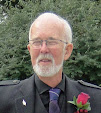I was born in a city of economic migrants: from Ireland, from Wales, from Scotland, from Aftica, from the West Indes, from China. and doubtless many other places ('though, oddly, in the 40s and 50s few people from the Indian sub-continent). I expect there were plenty from other parts of England too although I rarely recall meeting a through and through English person when I lived there.
I moved to a satellite of Manchester to work in my 20s and then, to get experience and for a considerable drop in salary, I moved to the Outer Hebrides. I was called, by a few, a 'bloody incomer taking away our jobs.'. The then Convener of the Council (a Minister of Religion) once said to me "But you're not one of our kind and you'll soon leave for better things. That's what incomers do."
I have to say that such comments and sentiments appeared to me to be relatively few and far between and I have always felt welcome by the majority and have always felt part of this Island. I would like to think that all the many, many economic migrants from this Island, whether they went to Glasgow, Toronto, South Georgia (whaling) or Australia and New Zealand (as £10 Poms) were made as welcome where they went.
After all almost everyone on this Island (of Lewis and Harris) is descended from an economic or refugee migrant of some sort: whether it be from a Viking who came to farm a thousand years ago or from someone who came more recently in the times of the clan troubles.
The little band of countries known as Great Britain colonised much of the world. We didn't adopt the traditions and languages of the countries we conquered: we imposed our traditions and language. And Scots were amongst the greatest explorers and conquerors that Great Britain had.
You and I have the standard of living we have now, including, in the UK, perhaps the largest almost totally free health and welfare service in the world, because of the economic migrants and conquerors of our countries' past and the toil of our forefathers. And, yes, some got obscenely rich and some lived wretched lives in intolerable conditions.
My generation in Great Britain have probably lived in the longest period in the last thousand years where no war was fought on our soil. We have not had to flee for our safety.
And let the Tories amongst you never forget Norman Tebbits' words "I grew up in the '30s with an unemployed father. He didn't riot. He got on his bike and looked for work, and he kept looking till he found it." He wasn't fleeing persecution like the fathers of some of our leaders. He was an economic migrant.












































